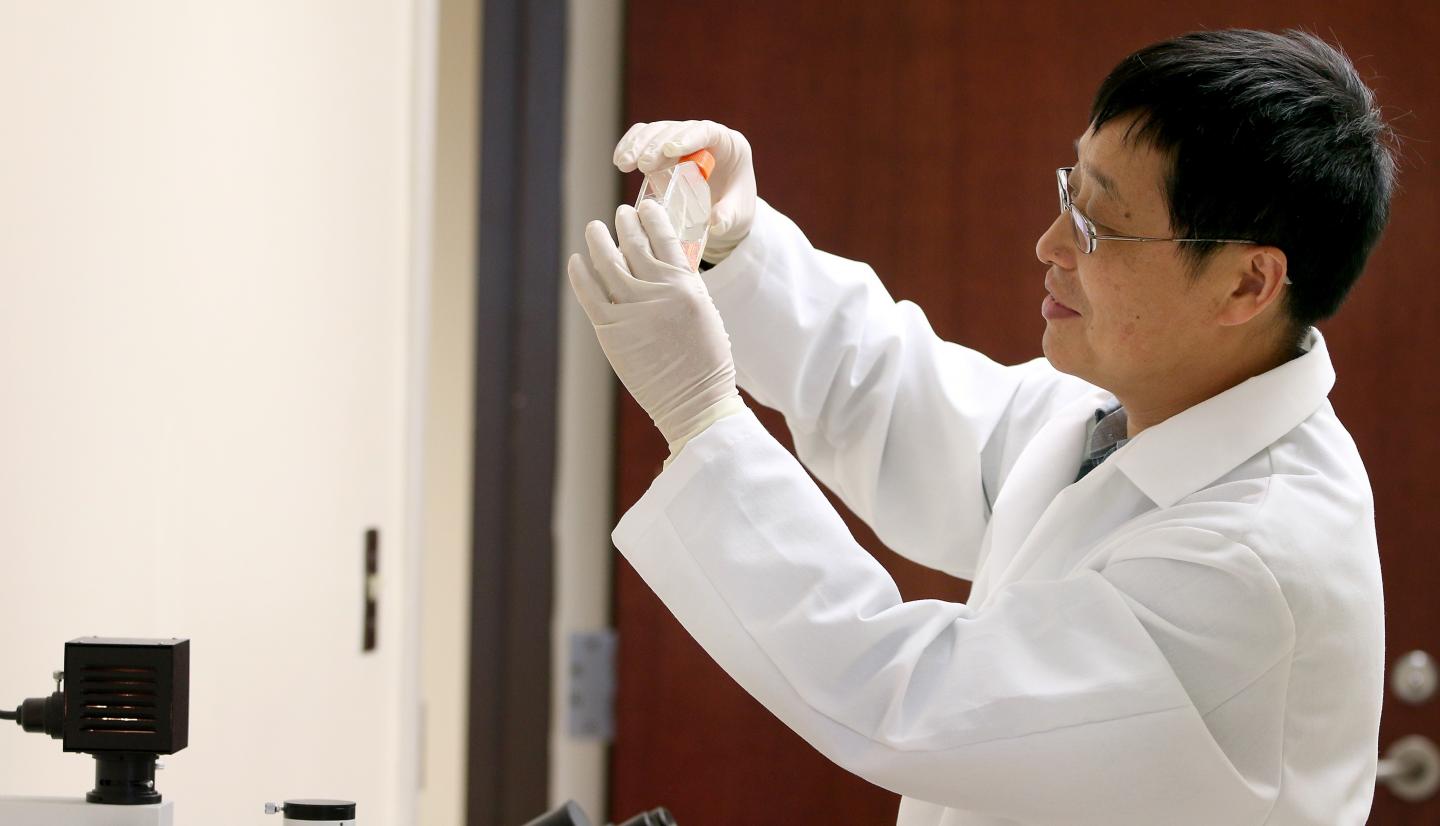Graft-vs-host disease (GVHD) is a major complication of bone marrow transplant, a potentially curative therapy for blood-borne cancers. Targeting Sirt-1 shows preclinical promise in controlling GVHD, report MUSC investigators in Blood.

Credit: Sarah Pack, Medical University of South Carolina
Bone marrow transplant (BMT) offers patients with leukemia and lymphoma a potentially curative treatment. Bone marrow from the donor contains healthy immune cells (T cells and B cells), whose mission is to protect the body from invaders. These immune cells can target the recipient’s cancer cells, helping protect against tumor relapse.
This procedure, however, is not without risk. T cells can also recognize the recipient’s tissues as foreign and attack them. This phenomenon, known as graft-vs-host disease (GVHD), can cause serious complications in transplant recipients, significantly reducing their quality of life.
The standard procedure to prevent GVHD is to treat patients with drugs that suppress T cells. However, this makes patients more susceptible to infections and increases the risk of tumor relapse. Even with this therapy, 30 to 50 percent of patients develop acute GVHD and about 70 percent develop some degree of chronic GVHD.
“GVHD can be expected to occur in the majority of transplanted patients,” says Xue-Zhong Yu, M.D., professor of Microbiology and Immunology in the College of Medicine at the Medical University of South Carolina (MUSC) and SmartState Endowed Chair in Cancer Stem Cell Biology and Therapy at Hollings Cancer Center. “More treatment options are desperately needed.”
Yu led a team of MUSC researchers who showed that targeting the enzyme Sirt-1 helped control GVHD in mice, without increasing tumor relapse. They reported their findings in an article published online December 4, 2018 by Blood. In BMT models, mice that received a Sirt-1 inhibitor lived longer and had better clinical scores than those that did not. This effect appears to be mediated through T cells.
“What’s exciting about our study is that Sirt-1 regulates different subsets of T cells differently,” says Yu. “So by inhibiting it, we can suppress T cells that lead to GVHD without affecting those that protect against tumor relapse. Also, blocking Sirt-1 could be effective in preventing both acute and chronic GVHD.”
Acute and chronic GVHD are very different diseases, distinguished primarily by time of onset and clinical manifestations. Acute GVHD occurs during the first months after transplant, while chronic GVHD reduces the long-term quality of life of patients.
Although treatment options have improved for acute GVHD, chronic GVHD remains a therapeutic dilemma. It causes widespread scarring (fibrosis) of the organs affected, leading to loss of organ function. In this study, blocking Sirt-1 showed a positive effect, even after chronic GVHD had developed.
In chronic GVHD, B cells are activated (triggered to grow) and differentiated (specialized in their immune function). Sirt-1-deficient T cells reduced B cell activation and differentiation in chronic GVHD mouse models.
“This indicates that Sirt-1 plays an important role in T- and B- cell interaction in GVHD development,” says Anusara Daenthanasanmak, Ph.D., who was a postdoctoral fellow in the Yu lab while doing this work and is now at the National Institutes of Health. “By blocking Sirt-1 activity, we could have a potential treatment for both acute and chronic GVHD.”
Yu’s lab is interested in exploring further the role of Sirt-1 in the regulation of B cells. “B cells are critical in the pathogenesis of chronic GVHD,” says Yu. “That is still a gap we need to fill in.”
Although the preclinical results are strong, much needs to be done before they can affect patient care.
“I hope to be able to translate the findings in my lab to the clinic,” says Yu. “But, first, further studies are needed to examine the role of Sirt-1 in human T cells and in a human setting, assessing correlations in patients.”
###
About MUSC
Founded in 1824 in Charleston, The Medical University of South Carolina is the oldest medical school in the South. Today, MUSC continues the tradition of excellence in education, research, and patient care. MUSC educates and trains more than 3,000 students and residents, and has nearly 13,000 employees, including approximately 1,500 faculty members. As the largest non-federal employer in Charleston, the university and its affiliates have collective annual budgets in excess of $2.2 billion. MUSC operates a 700-bed medical center, which includes a nationally recognized Children’s Hospital, the Ashley River Tower (cardiovascular, digestive disease, and surgical oncology), Hollings Cancer Center (a National Cancer Institute-designated center) Level I Trauma Center, and Institute of Psychiatry. For more information on academic programs or clinical services, visit musc.edu. For more information on hospital patient services, visit muschealth.org.
About Hollings Cancer Center
The Hollings Cancer Center at the Medical University of South Carolina is a National Cancer Institute-designated cancer center and the largest academic-based cancer research program in South Carolina. The cancer center comprises more than 100 faculty cancer scientists and 20 academic departments. It has an annual research funding portfolio of more than $40 million and a dedication to reducing the cancer burden in South Carolina. Hollings offers state-of-the-art diagnostic capabilities, therapies and surgical techniques within multidisciplinary clinics that include surgeons, medical oncologists, radiation therapists, radiologists, pathologists, psychologists and other specialists equipped for the full range of cancer care, including more than 200 clinical trials. For more information, visit http://www.
Media Contact
Heather Woolwine
[email protected]
843-792-7669
Related Journal Article
http://dx.




